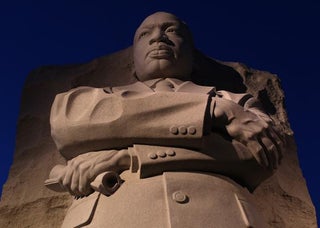

For daily picks of new and classic nonfiction, check out Longform or follow @longform on Twitter. Download Longform’s app to read the latest picks and follow any writer or publisher, including Slate. Letter From Birmingham Jail
Martin Luther King, Jr. • Liberation • May 1963
On the moral responsibility to break unjust laws.
There comes a time when the cup of endurance runs over, and men are no longer willing to be plunged into the abyss of despair. I hope, sirs, you can understand our legitimate and unavoidable impatience. You express a great deal of anxiety over our willingness to break laws. This is certainly a legitimate concern. Since we so diligently urge people to obey the Supreme Court’s decision of 1954 outlawing segregation in the public schools, at first glance it may seem rather paradoxical for us consciously to break laws. One may well ask: “How can you advocate breaking some laws and obeying others?” The answer lies in the fact that there are two types of laws: just and unjust. I would be the first to advocate obeying just laws. One has not only a legal but a moral responsibility to obey just laws. Conversely, one has a moral responsibility to disobey unjust laws. I would agree with St. Augustine that “an unjust law is no law at all.”
An Open Letter to Wikipedia
Philip Roth • The New Yorker • September 2012
An author asks to amend his entry.
I am Philip Roth. I had reason recently to read for the first time the Wikipedia entry discussing my novel “The Human Stain.” The entry contains a serious misstatement that I would like to ask to have removed. This item entered Wikipedia not from the world of truthfulness but from the babble of literary gossip—there is no truth in it at all.
Apologia to My Second Child
John Hodgman • Psychology Today • January 2007 On the wonders of being an only child.
I commandeered one of these rooms for the purpose of my practicing the clarinet and the viola. This pretty much sums up being an only child to me. Only an only child could afford to take up not one but two relatively esoteric supporting instruments. And when I say afford, I speak not only of the actual cost of lessons. A siblinged child enacts his own insecurity when he picks up the guitar, the violin, the piano, those desperate showboat instruments all yearning to solo. But an only child has no need for these sorts of games. Assured of love and sustenance and space and time, the only child is free to cultivate idiosyncrasy.